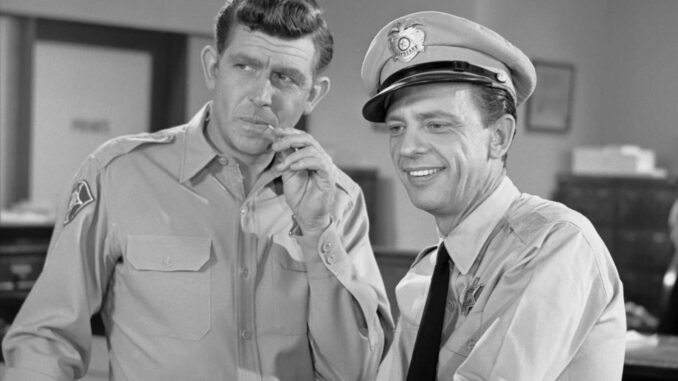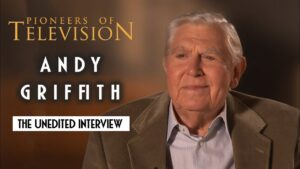
Don Knotts, who played Deputy Barney Fife on The Andy Griffith Show, reached the heights of comedy. To this day, viewers still find his antics funny. Let’s take a look back at where he obtained the slapstick tactics and why he did it.
The mother of Don Knotts from ‘The Andy Griffith Show’ faces some difficult challenges
Firstly, a little background. Knotts’ family situation was difficult to say the least. According to Daniel de Visé’s book Andy & Don: The Making of a Friendship and a Classic American TV Show, Knotts’ father, Jesse, collapsed one day in 1919. Perhaps he had a nervous breakdown or perhaps he was “an undiagnosed schizophrenic.” From that point on, Knotts’ mother, Elsie, was “left to tend the family fortunes” while Jesse often behaved like a “monster,” terrorizing Don and the rest of the family.
Because of how horrible living with Jesse became, Knotts was drawn to his mother whom he viewed as an angel. Knotts really enjoyed how the comedians of the day, such as Stan Laurel, Oliver Hardy, and Jack Benny could make his mother laugh. de Visé says “Elsie Knotts had a lovely, infectious, musical laugh, and everyone in the Knotts home wanted to hear it.” Laughing became the family “escape.” So where did Don pick up on the crazy ways to make his mother laugh and ultimately would be brought into the homes of millions of TV viewers?

Don Knotts and his brother, “Shadow” Knotts
Knotts learned a lot from his brother, William Earl, who was called “Shadow” because of his slender frame. de Vise’ states that Shadow brought laughter and wit into the family. “Don would follow Shadow around the house like a pint-size Ed McMahon, encouraging his cracks with peals of delighted laughter.” It was Shadow who was the “family jester” because he found that making family members laugh “could deliver his family from the darkness of dementia and poverty.” Shadow endeavored to counter the “chill” of the father’s presence in the home.
Knotts stated, “The clowning would begin with Shadow buttering his bread as if it were a violin, tucking it under his chin and using the butter knife for a bow and it might continue with Shadow commenting to Sid under his breath, but loud enough for all to hear that poor Tom Helfrick had helped himself to two helpings of meat already.” Knotts said he would laugh so hard that he would leave the table and his mother would have tears running down her cheeks.
Where his comic talent went from there
The humor that Knotts experienced in his home would form the basis for his later acting. This leads to an interesting question – was Knotts ever recognized for his comedic talents beyond his family?
According to emmys.com, Knotts was quite successful in his comedic roles. He won the Emmy for Outstanding Performance by an Actor in a Supporting Role in a Comedy for his role in The Andy Griffith Show in 1961, 1962, 1963, 1966, and 1967. Knotts went far beyond just making his mother laugh.
